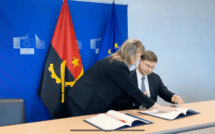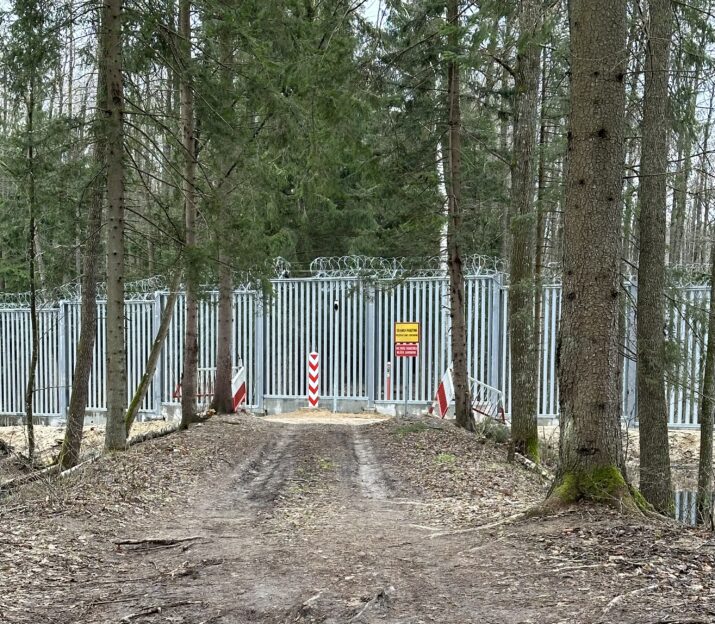
By Karol Cichocki
It was a rainy summer day in early August 2023 when the twenty-three-year-old Hadi from Afghanistan stood next to me and my friends on the outskirts of the primeval Białowieża Forest in Eastern Poland, which spans the border with Belarus. Covered with a dark blue poncho, he looked afraid as we waited for the Border Guard to arrive. Before their arrival, he signed a power of attorney form and a declaration that he wanted to ask for asylum in Poland. When the green Land Cruiser arrived, two officers came out. We told them that Hadi was asking for asylum, that we were witnesses, and that we hoped they would respect his laws. After a short conversation and a quick documents check, they drove away.
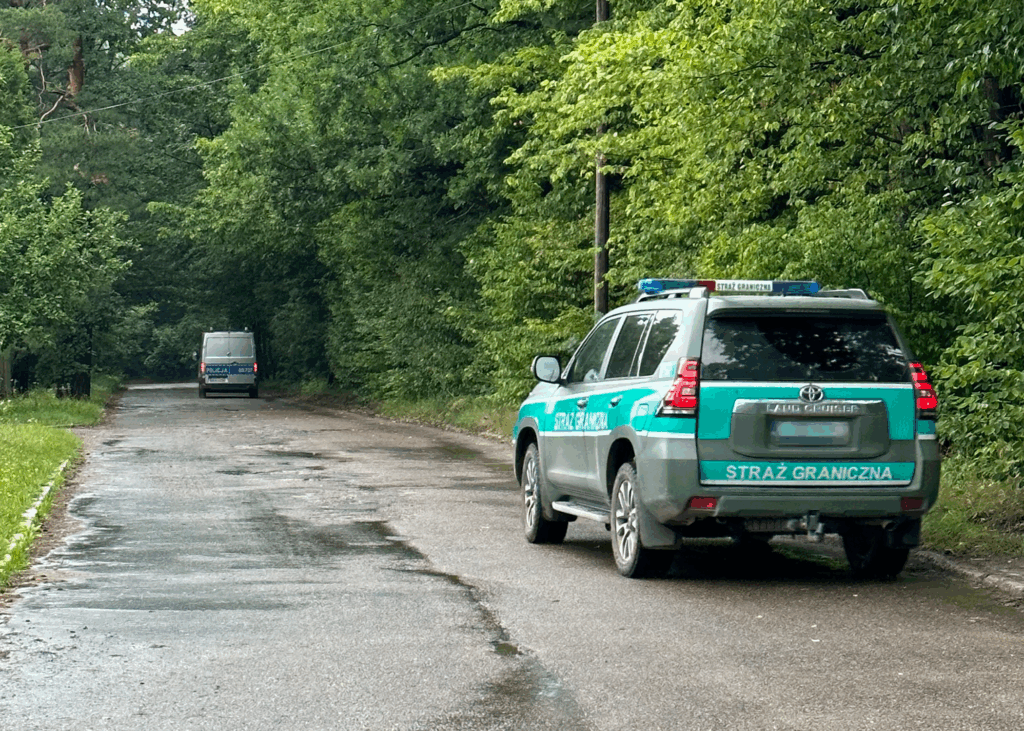
We found Hadi just by accident. After a short walk in the forest, we came across someone lying on the ground. I froze for two seconds. Then, we quickly approached the person who turned out to be alive but exhausted: “I was just praying for someone to help me,” he said, “I just threw myself near the road so someone could help me.” He had run out of water and ate the wild berries he had collected on his way. He told us that he had been pushed back one time and suffered violence from the Polish authorities. “They caught us in the forest, and they did a lot of bad things to us, like asking us to dance for them, asking us to sing, asking us to make shapes of animals for them, laughing at us, telling jokes about us. While it was raining, they were telling us to lay down on the wet ground,” he said. We waited several hours to confirm that Hadi was taken to the nearest Border Guard station. This time, the law worked. But today, with the right to asylum suspended, he would not have any chance.
XXX
On March 27, 2025, Polish Prime Minister Donald Tusk signed off on an order that suspended the right to ask for asylum for migrants irregularly crossing into the country through the border with Belarus for 60 days. It has been prolonged ever since, most recently on July 29. The bill was signed to prevent the alleged instrumentalization of migration movements used as a tactic in hybrid warfare. The proposed bill and the final decision caused backlash from prominent NGOs like Human Rights Watch and Amnesty International. They say it violates the Polish Constitution and international law. “It has been invoked since 2021 by Poland, Latvia, Lithuania and more recently by Finland, as an excuse to adopt damaging and regressive migration policies and practices. Like similar legislation in Lithuania, Latvia, and Finland, the new Polish legislation does nothing to protect people from the actions of Belarus against refugees and migrants, but rather compounds the harm done to them by removing people’s rights to seek asylum and exposing them to a risk of refoulement by the Polish authorities, including as a result of violent summary forced returns (“pushbacks”), which have been well documented by Amnesty International and others at this border,” said Amnesty International in their statement.
This just added another point to the list of human rights violations committed by Poland. Against the Polish law and international regulations, in 2021 the Polish government implemented an order allowing the pushback. When caught by the Border Guard, refugees, migrants, or asylum seekers can be driven back to the border and expelled from Polish territory, often through the gates installed in the 115-mile border wall. In an interview in August 2025, Hanna Machińska, a prominent Polish human rights scholar and Poland’s deputy Human Rights Commissioner from 2017-2022, told me “I call them ‘wywózki’ (pronounced as vih-VOO-skee, which translates to forced deportations) because in Polish it is often referred to more neutrally, in legal language, as ‘returning’ someone to the border line.” Machińska used her authority to help and protect many people who crossed the Belarusian border, and she still serves as one of the most influential advocates for the issue. She added, “But what does that really mean? Returning to the border line is simply deportation, just like it was in the past — in different historical periods, including the postwar 1940s and 50s, when Polish citizens were deported to the Soviet Union, to Siberia. In fact, in Polish literature and articles, the English term “pushback” is also used, but I believe we should call them deportations. That’s what they are. At night, people are taken into the Białowieża Forest and pushed across to the Belarusian side. Children have been dumped, women expelled — it’s brutal and inhumane.” According to We Are Monitoring, an organization that collects data about the crisis, there were more than twelve thousand documented pushbacks. However, many pushbacks go unnoticed due to the lack of documentation, and one person could be a victim of multiple pushbacks. Close to one of the forest roads that leads to the border wall from the town of Białowieża, there is a Memorial of the Soviet Deportations to Siberia. One of the slogans on the accompanying information board says, “memory and message for the future.”
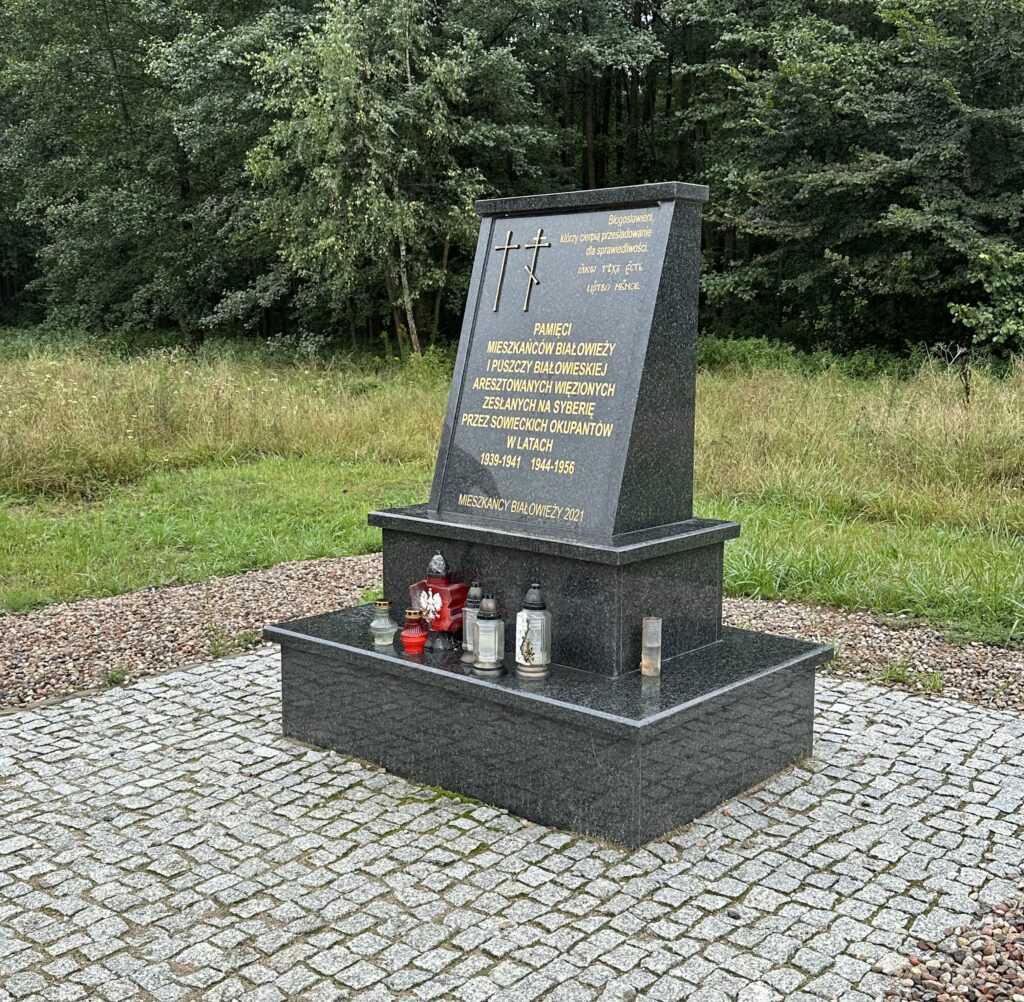
More than one hundred people have died on both sides of the border, and hundreds are missing since the humanitarian crisis on the Polish-Belarusian border erupted during the summer of 2021 because of the actions of the Belarusian and Russian regimes, which used people desperate to get into EU countries as pawns. Most of them pay thousands of dollars to get smuggled through the border. I personally reviewed many documents—passports, visas, bank statements—left behind in the forests, confirming their route.
The Polish government’s response has been a racist campaign vilifying the refugees as a threat to national security. During a press conference in September 2021, the Polish Minister of the Interior of the Law and Justice party played a clip showing a man having sex with a horse and purporting it was a film recorded by one of the Afghan refugees stopped on the border. The claim was reported on state-owned television. “Raped a cow and wanted to get into Poland?” said the introduction to the report. (It turns out the clip was from a bestiality porn video widely available online.) In the fall of 2021, the government declared a state of emergency and created an exclusion zone, where only local residents could enter the border counties. This state of emergency lasted for several months before being completely lifted in the summer of 2022 because of the completion of the border wall.
Governing since late 2023, the liberal-conservative Civic Coalition claims to act in the name of Poland’s security and the integrity of its borders. Despite the hopes expressed by some, the Civic Coalition is continuing the violent and unlawful response to the crisis. With the Civic Coalition coming into power, Poland has often been portrayed as a success story of turning against illiberal trends. Still, in a tense situation in Central and Eastern Europe, this liberal democracy has decided to suspend the right to ask for asylum, one of the fundamental human rights. Playing on the fears of “illegal immigration” was also a key element in the recent presidential election campaign in Poland, won by the former far-right hooligan, Karol Nawrocki.
It should be the state’s responsibility to save these migrants’ lives, but instead it is the activists and volunteers who are taking on the heavy burden of trying to create an environment where human rights are respected. For their work, in the summer of 2022, the former Polish president called them “idiots and traitors.” I decided to be one of them.
XXX
I met the activists of the Podlaskie Ochotnicze Pogotowie Humanitarne (Podlasie Voluntary Humanitarian Rescue Service, POPH) in December 2022, when I arrived in the village of Bohoniki, less than six miles from the Polish border with Belarus. On the side of a hill lightly dusted by snow, Imam Aleksander Bazarewicz was leading a prayer while the coffin of 21-year-old Sidding Musa Hamid Eisa was lowered into the grave. A heavy backpack had dragged Eisa underwater as he was trying to cross a nearby border river. Standing behind Katarzyna Mazurkiewicz-Bylok, one of the POPH activists, on her phone, I saw a person in a yellow hijab crying. I later learned it was the victim’s sister. The ceremony at the Mizar in Bohoniki, the largest Muslim cemetery in Poland, was transmitted over social media and directly to Eisa’s family in Sudan.
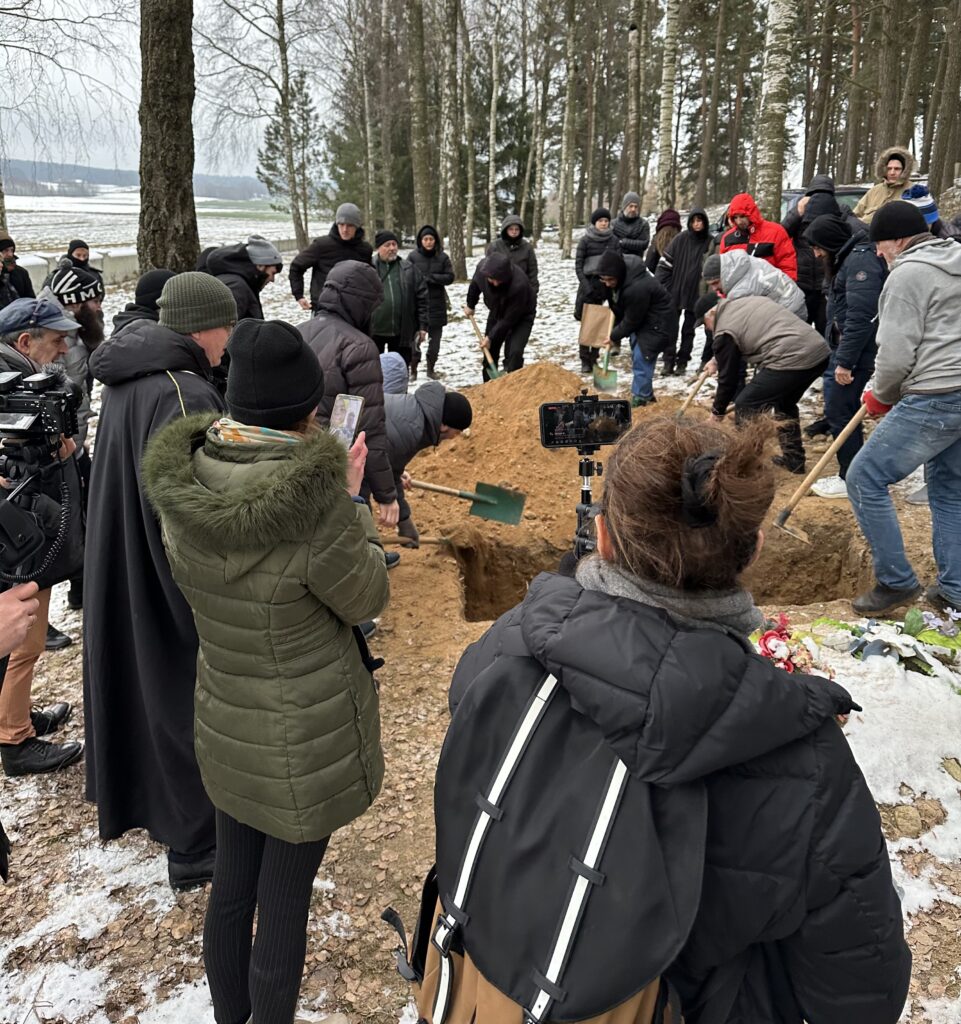
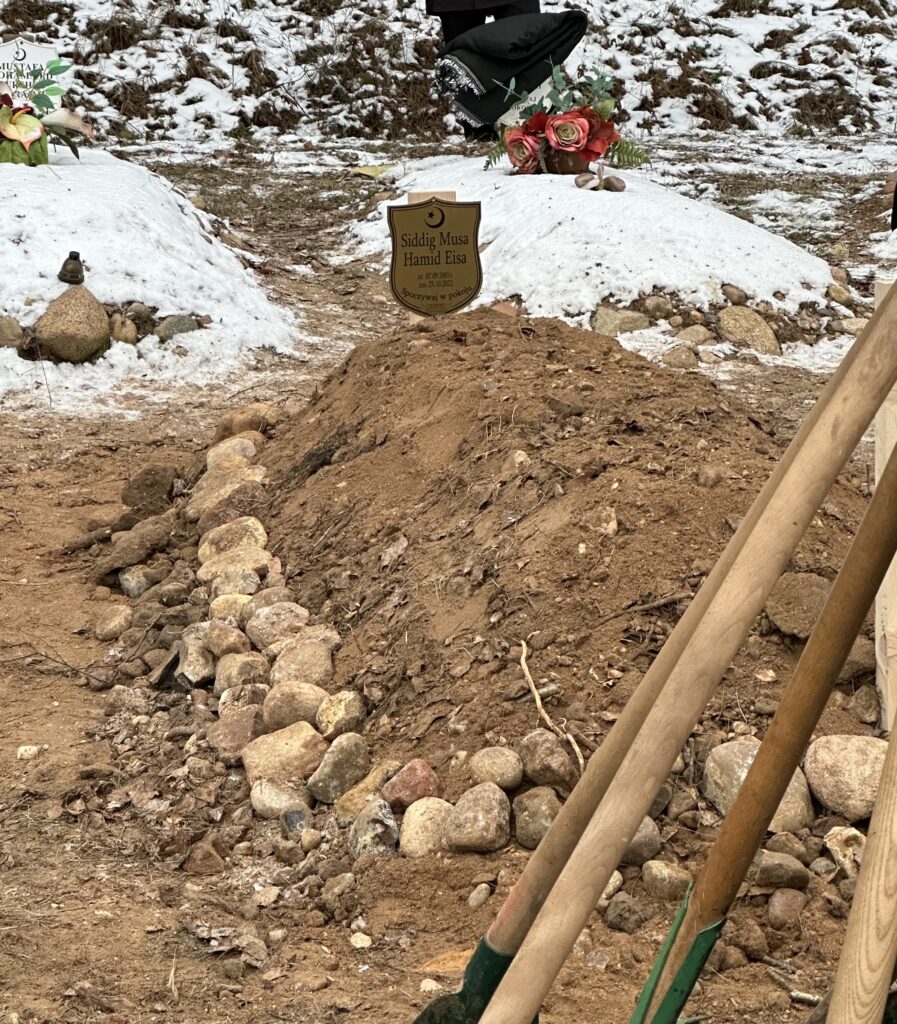
It wasn’t the first time I had found myself in the region of Podlasie in Eastern Poland. I grew up in the city of Białystok, an hour’s drive away. As a teenage Scout, I’d walked the local forest roads and paths all along the border. We navigated the swamps and the dense forests with compasses and old Soviet military maps. On our way, we were often assisted by the Polish Border Guard. I never imagined that twenty years later, I would be returning here regularly, also to the funerals. “I hope this is the last death like this,” Imam Bazarewicz said at the end of the burial service. But it wasn’t.
XXX
At first, I wasn’t in the loop regarding the interventions. However, at the beginning of 2023, there weren’t many requests for help. I learned from Katarzyna Mazurkiewicz-Bylok, who lives in a nearby border town, that POPH’s emergency number circulates among different WhatsApp and Facebook groups. People add it to their contacts in case they need help. If they do, they reach out directly to the group. After a while, I was shown the location of the secret storage, where food, clothes, medication, backpacks, and shoes are kept and prepared for the interventions. I had to install Signal, a secure messaging app. In the beginning, I often had to pick up and sort through care packages sent from all around Poland. Some contained socks, some gloves, and some instant soups. I also helped prepare food packages that could quickly be packed in a backpack before heading out into the forest.
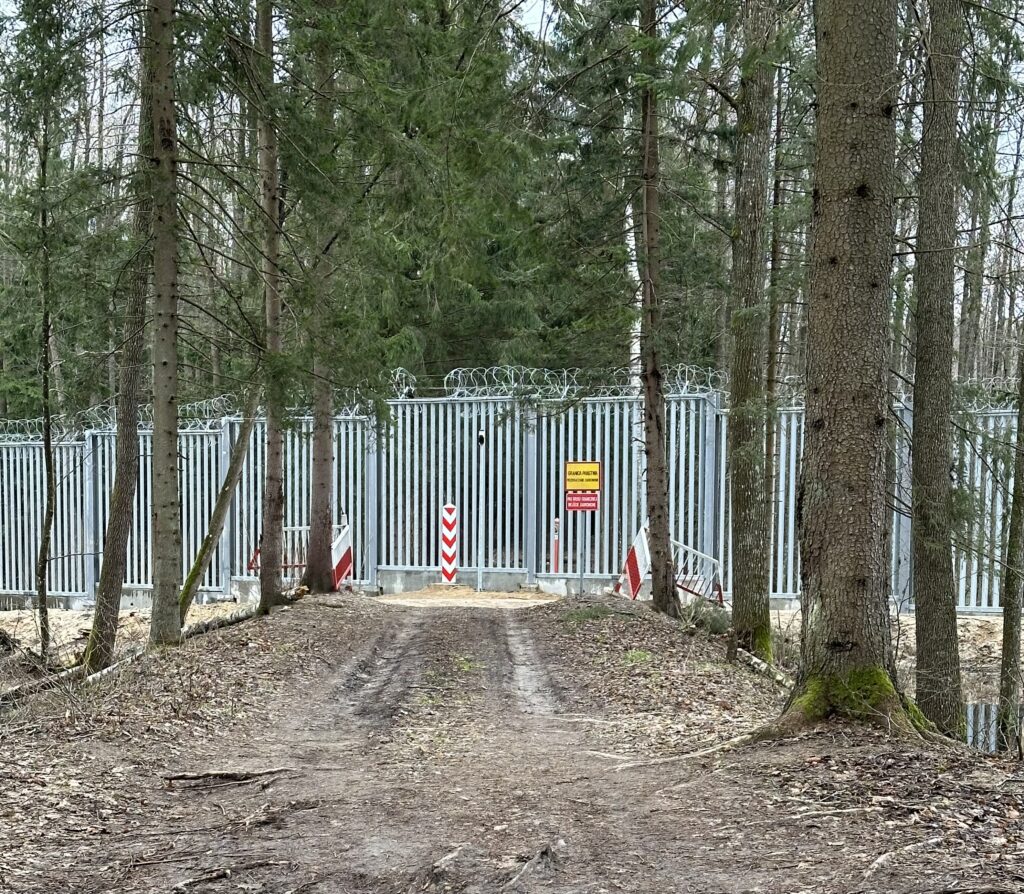
For the first patrols in the dense primeval Białowieża forest, which extends for miles on both sides of the border, I went with Katarzyna and Mariusz Kurntya, known on social media as Człowiek Lasu (Forest Man). In January and February, they showed me how to navigate the forest. When we got off the path, I was stunned to see how many clothes, empty water bottles, backpacks, and destroyed smartphones we found. Mariusz told me the crushed devices indicated someone had probably been caught: “Who would normally smash their own phone?” I would later learn that it is a common practice used by the authorities. A smartphone is one of the most indispensable items for refugees in the forest. Without it, they don’t have access to Google Maps or contact with family or the smuggler they’re trying to reach. Being without a phone puts their lives in great danger.
XXX
It was an early evening in late March 2023 when I received a message from Mariusz that eight men needed our help, and he asked me if I was ready to go. We quickly drove to the storage site where Eliza Kowalczyk, also a member of POPH, was already preparing clothes and food. We later met the other two volunteers who decided to go with us. As I was driving, Mariusz chose a safe place to park the car and the route we would take through the forest. It was almost completely dark as we navigated the forest, and occasionally we had to go around collapsed trees and swamps. After about half an hour, completely sweating and exhausted from carrying the heavy backpacks and bags of shoes, we reached a red pin on Google Maps, the place where we were supposed to find the group. We couldn’t see anyone. Mariusz whistled delicately, and the whistle returned just a few feet away. The whole group was low to the ground. I was instructed to first give them the soup, then to explain that they had clothes and other stuff prepared in the backpacks, and that we had to leave quickly, as it wasn’t safe for us to stay. When I passed a plastic bowl of soup to one of the men, he just said he was from Syria and asked about my name. “Thank you, Karol. I will never forget you,” he said, smiling at me as I was preparing to leave.
The next day, still emotional after the first encounter, I confessed my mixed feelings to Eliza about leaving the group in the forest, not knowing their fate. “Those are the most challenging moments, especially when there are small children in the group,” she said. “You turn back to them and go home to your regular life. It’s unbearable.” A couple of days later, I learned the group was safe.
In early spring, I would often be in the forest with Mariusz and Eliza or just with Mariusz. Sometimes, we would get requests from different groups. Sometimes, it would turn out that part of the group had already gone missing before we could reach them. The more time I spent in the forest, the more I realized how hard it was to navigate. With the change of seasons, the same place can look completely different, so I couldn’t rely on having been in an area of the forest many times. Even with proper shoes and clothing, I realized how incredibly exhausting it was to make it through. Along with the Mediterranean Sea, the Darien Gap, and the Sonoran Desert, the Białowieża forest and other remote parts of the border with Belarus have become a graveyard for migrating people. Nature is being used as a lethal weapon against them. Some people drown in the border rivers, as did Sidding Musa Hamid Eisa. Just this year eleven bodies were found in the Bug River. Some of them die because they just can’t make it through.
At the end of April, on one of the first warm spring days, I found myself walking through the Białowieża forest with Eliza and Mariusz. We were patrolling the area for signs of crossings and picking up some of the items that had been left behind. We saw what looked like boot tracks in the mud. Eliza, who is also an experienced wildlife photographer, can easily distinguish between different traces. We decided to follow the path. We were not that far from a trail maintained for tourists when I heard Mariusz’s voice on the radio, “I see something.” I looked and saw something beige with greyish shades on the ground, among the shoots of white anemones. As I got closer, I saw the feet. Then, the whole body came into view. Looking to the left, I saw some dirty clothes spread around. Head tilted, mouth and eyes opened. The person was lying naked on his back with his hands spread to the sides. “Like a Christ on the cross,” was the first thing I said in shock to the others when I realized we had found a dead person.
As there was no cellular service in the forest, Mariusz recorded a short video for the POPH’s Facebook page to inform them that we had found a body and were leaving the area to report it to the authorities. The prosecutors, assisted by the police and the border guards, arrived at the scene as it was getting dark. “It’s a typical case of hypothermia,” one of the prosecutors told me. He also explained that in the late stage of hypothermia, people undress as they feel like their body is on fire. These are usually the last moments of their lives.
XXX
When the full-scale invasion of Ukraine broke out in early 2022, I went to the Polish-Ukrainian border to help and to drive some people fleeing the war. When I arrived at the border, I saw tents of prominent humanitarian aid organizations. I saw field kitchens with smiling volunteers. I saw how the Polish authorities, with patience, helped some of the people who crossed the border. Of course, I also noticed that the skin color of the people openly welcomed on Polish soil was like that of the dominant group in Polish society. Months later, I saw a radically different reality when I arrived at the border with Belarus. In the name of security, Poland erected a wall that, like most other border walls, doesn’t stop people from crossing, no matter what the official propaganda says. The wall just causes more suffering for the most vulnerable. I didn’t see any large humanitarian aid organizations here, although I’m aware that some of them provided items of basic needs that we used in the forest. On this border, it could even be a risk to have large organizations with their logo plastered on every jacket, t-shirt, or car because this might unnecessarily put the people needing help in danger. Here, the help must be invisible, and so the suffering is invisible. The whole system of help here is built on the people who are willing to deliver aid despite the state’s oppression. Even though most of the activists are exhausted, they are left alone. There is no UN here. It’s hard to find any statement from the European Commission reminding Poland that these policies are illegal and that it could face serious consequences.
I asked Hanna Machińska if she thinks that the European Commission is too passive. “I think the word “passivity” may not be the best term — meaning, when it comes to the European Commission, the Commission is simply characterized by its unwillingness to take any action,” and she added, “This is a situation of passivity, almost neutrality — in the sense of ‘we do nothing’— but here it is necessary for the European Commission to act as the guardian of the treaties and to ask the government how it is possible that the right to asylum has been suspended, how it is that pushbacks are still in force?”
On August 31, 2025, the European Commission President, Ursula von der Leyen, joined Polish Prime Minister Donald Tusk on a visit to the border with Belarus. Surrounded by the Border Guard, military, and their security detail, they held a press conference against the border wall. They both spoke of the much-needed protection against the threat from Russia and Belarus, about the additional funds to support the expansion of the infrastructure, and “migration management.” In her closing remarks she said, “I want to thank you for the Polish leadership, in showing how courage, determination, but also knowledge about our history, and what we can learn from it, comes together in a very concrete action to protect not only the Polish border, but to protect the European border, that’s not only to protect the Polish people, but to protect Europeans, and as you’ve said the whole democratic world.” No words about the refugees and migrants, who are the most vulnerable victims of this situation.
The situation is difficult not only at the Polish-Belarusian border, but also at the Polish-German border, which has now become a topic of political debate. The Polish far-right has mobilized and started spreading mostly exaggerated information that Germany is sending migrants to Poland, who, in their rhetoric, are a threat. They even created a paramilitary group like “We defend the Polish Border” (some of their members were following the activists from my organization on the border with Belarus) or “Border Protection Movement.” In response, the government reinstated controls at the border crossings with Germany and Lithuania, which is just what the far-right wanted. “This must be seen in its entirety, because there is a growing climate of hostility toward foreigners. Even Ukrainians who have long been in Poland are being treated as outsiders. On the one hand, we say: “We need them, they contribute 15 billion zlotys to the budget.” On the other hand, we say: “We don’t want them, we don’t want to pay for them.” This is unacceptable,” says Machińska.
In early 2024, as POPH we became an officially registered NGO in Poland. We continue to operate our emergency phone number for anyone in need of humanitarian aid. Despite the growing militarization of the area and the billions of euros flowing into the East Shield project, people continue to cross the border. Just last month, we received tens of requests for help.
XXX
In August 2025, two years after we accidentally met in the Białowieża forest, I met with Hadi at one of our go-to cafes in Warsaw. With a little bit longer and slightly curly black hair, he smiles when I approach the table. Since then he has been granted a status in Poland that allows him to legally live and work in the country. We spoke of his plans. “You know, I’m just going with the flow.” He works at a small restaurant and has managed to get into a coding workshop that he dreamed of for a long time. “I go there and learn stuff by doing the real projects, and there are no teachers to help you. You just need to Google it or ask your peers. It’s going to last for two years. But I can finish as soon as possible,” he says, and adds, “I feel very lucky I had the chance to escape and be safe right now.”
Author Bio:
Karol Cichocki is a writer and human rights activist based between Brooklyn, New York, and Warsaw, Poland. He holds an MFA in Literary Reportage from NYU and is currently pursuing a degree at the Center for European and Mediterranean Studies at NYU. His work focuses on the protection of refugees, migrants, and asylum seekers, as well as the history and legacy of democratic opposition in Central Europe, the politics of memory, and the history of Poland’s far-right and antifascist movements. He is also a cofounder of the Podlaskie Voluntary Humanitarian Rescue Service, which operates along the Poland–Belarus border.
Published on September 23, 2025

